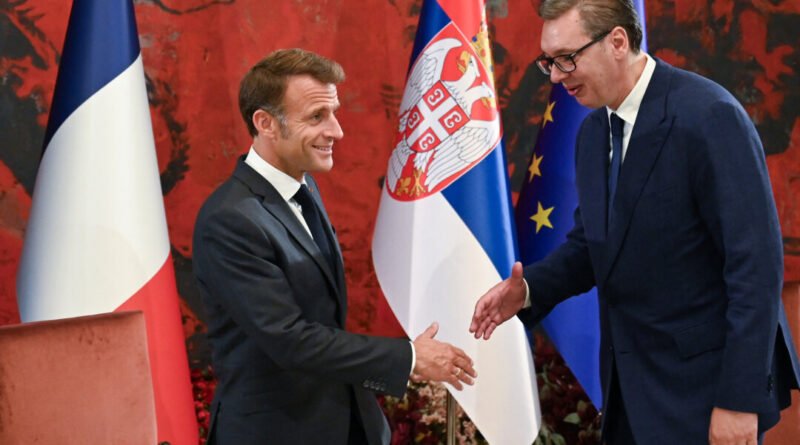Serbia Agrees to Purchase 12 French Fighter Jets in $3 Billion Deal
Serbian President Aleksandar Vučić revealed the signing of a deal worth about $3 billion for the procurement of 12 French-made Rafale fighter jets on August 28.
France and Serbia have reached an agreement for the acquisition of 12 French-built fighter jets, indicating a potential shift in Serbia’s reliance on Russian arms.
The Rafale, a twin-engine, multi-role fighter jet, was introduced into the French military in the early 2000s and has been adopted by several other countries, including Croatia, Egypt, Greece, Qatar, and India.
Vučić highlighted on Wednesday, “Serbia will possess twelve brand new aircraft, which represents a substantial enhancement of our army’s operational capabilities.”
The purchase deal, valued at approximately 2.7 billion euros (around $3 billion) according to Vučić, will also include auxiliary support for maintaining the newly acquired fighter jets.

Two Rafale jet fighters fly over Iraq in this remote camera screen grab photo provided on Sept. 19, 2014, by the French Army’s video and photo department. ECPAD/AP Photo
Trappier assured on Thursday during a press conference, “Dassault Aviation and its partners express gratitude to the Serbian authorities for choosing the Rafale, and we are fully committed to its successful integration into the Serbian Armed Forces.”
He also added, “Serbia’s decision to acquire a Dassault aircraft for the first time validates the Rafale’s operational excellence in serving a nation’s sovereign interests.”
Serbia’s Regional Relations
For over two years, Serbia had been contemplating acquiring the new Rafale jets after Croatia, its Balkan neighbor, placed an order for 12 used Rafales.
The acquisition of the Rafale fighter jets enables Serbia to modernize its fighter fleet, currently comprising Soviet-era MiG-29 fighters and Soko J-22 Orao ground-attack aircraft developed by Yugoslavia in the 1970s before its dissolution in 1991 and 1992.
Although Russia has traditionally been a key military equipment provider for Serbia, the Rafale purchase presents an opportunity to bolster ties with France and other Western European nations.
Since initiating steps to join the European Union in 2009, Serbia has not completed the ascension process. While maintaining relatively positive relations with Russia, E.U.-Russian ties have been strained, partly due to the conflict in Ukraine.
France, a NATO member, has consistently supported Ukraine in its conflict with Russia, while Serbia curtailed military cooperation with Moscow after the Ukraine invasion.

Russian President Vladimir Putin (R) and his Serbian counterpart Aleksandar Vucic give a joint press conference following their talks in Sochi, Russia, on Dec. 4, 2019. Shamil Zhumatov/Pool/AFP via Getty Images
Despite condemning the Ukraine invasion, Serbia, unlike the EU, has refrained from imposing sanctions on Moscow. The EU remains the largest investor in Serbia, with Western European companies employing a significant number of Serbs. However, Serbia heavily relies on Russian gas, and Russia supported Serbia in opposition to Kosovo’s independence.
While the purchase of the Rafale jets may encourage Serbia to align more with Western partners, there remains a concern that sensitive information about the French fighter jet could be obtained by Russia through Serbia.
Vučić, at a press conference on Thursday, reassured that Serbia would not share information related to the French fighter jets with Russia.
The Associated Press and Reuters contributed to this article.





